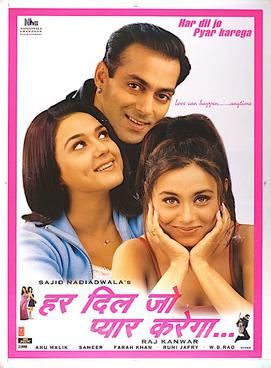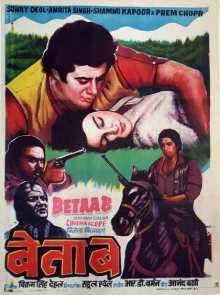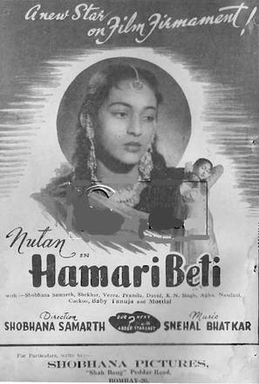Related Research Articles

Nutan Samarth Bahl, known mononymously as Nutan, was an Indian actress who worked primarily in Hindi films. In a career spanning nearly four decades, she appeared in more than 80 films, that ranged in genre from urban romances to socio-realist dramas. Regarded as one of the finest actors in the history of Indian cinema, Nutan was noted for her naturalistic acting style in parts of conflicted women often deemed unconventional. Her accolades include a record five Filmfare Awards for Best Actress. In 1974, Nutan received the Padma Shri, India's fourth highest civilian award.

Madhubala was an Indian actress who worked in Hindi-language films. Regarded as one of the greatest actresses in the history of Indian cinema, Madhubala was the highest-paid Indian star in the early 1950s. In a career spanning more than 20 years, Madhubala was predominantly active for only a decade but had appeared in over 60 films by the time of her death in 1969.

Shammi Kapoor (born Shamsher Raj Kapoor; was an Indian actor known for his work in Hindi cinema. Kapoor is considered as one of the greatest and most successful actors in the history of Indian cinema. In a career spanning over five decades, Kapoor worked in over 100 films. He is the recipient of three Filmfare Awards, including one for Best Actor.

Nargis Dutt was an Indian actress and politician who worked in Hindi cinema. Regarded as one of the finest and greatest actresses in the history of Indian cinema, Nargis often portrayed sophisticated and independent women. Her work was in a range of genres, from screwball comedy to literary drama, and earned her various accolades.

Amar Akbar Anthony is a 1977 Indian Hindi-language masala film directed and produced by Manmohan Desai and written by Kader Khan. Released in India on 27 May 1977, the film stars an ensemble cast of Vinod Khanna, Rishi Kapoor, Amitabh Bachchan, Neetu Singh, Parveen Babi, Shabana Azmi, Nirupa Roy and Pran. The plot focuses on three brothers separated in childhood who are adopted by families of different faiths; Hinduism, Islam and Christianity. They grow up to be a police officer, a qawwali singer and the owner of a country bar, respectively.

Mumtaz Askari Madhvani is an Indian actress who worked in Hindi films. Regarded as one of finest actresses of Hindi cinema, Mumtaz is the recipient of two Filmfare Award. Mumtaz made her acting debut at age 11 with Sone Ki Chidiya (1958), and did smaller roles in films like Stree (1961) and Sehra (1963).

Har Dil Jo Pyar Karega is a 2000 Indian Hindi-language romantic comedy film directed by Raj Kanwar, produced by Sajid Nadiadwala, written by Rumi Jaffrey, and edited by Sanjay Verma. Salman Khan, Preity Zinta and Rani Mukerji are featured in lead roles. The film is a remake of the Malayalam film Chandralekha (1997) which itself was inspired by the 1995 American film While You Were Sleeping.

Qayamat Se Qayamat Tak, also known by the initialism QSQT, is a 1988 Indian Hindi-language romantic musical film, directed by Mansoor Khan in his directorial debut, and written and produced by Nasir Hussain. The film stars Aamir Khan and Juhi Chawla in lead roles, making their acting debut. The film features music by Anand–Milind, with lyrics written by Majrooh Sultanpuri. Qayamat Se Qayamat Tak tells the story of two individuals and recounts their journey of falling in love, eloping, and the aftermath.

The Kapoor family is a prominent Indian show business family with at least 4 generations of the family over 95 years being active in the Hindi film industry. Numerous members of the family, both biological and those who have married into the family, have had prolific careers as actors, film directors and producers. "The Pioneer" founder of the dynasty was "The Patriarch", Prithviraj Kapoor, who was the first member of family to begin acting in movies with his 1929 debut film Be Dhari Talwar. He was a pioneer of Indian theatre and the founding member of Indian People's Theatre Association (IPTA). His son Raj Kapoor was the most influential actor and director in Hindi cinema. The genesis generation or the earliest linear generation of the Kapoor family tree to ever act in the films was Prithviraj Kapoor's father, Basheshwarnath Kapoor, who debuted as actor in 1951 film Awaara, which was produced, directed and starred in lead role by his grandson Raj Kapoor.

Geeta Bali was an Indian actress who worked in Hindi films. Bali is regarded among the finest actresses in the history of Indian cinema, Bali acted in over 75 films in a career spanning over two decades. She was twice nominated for Filmfare Awards.

Sadhana Shivdasani, known mononymously as Sadhana, was an Indian actress who worked in Hindi films. Regarded as one of the finest actresses of Indian cinema, Sadhana was noted for her exquisite beauty and trend-setting fashion statements. She was popularly known as "The Mystery Girl" for her stint as the "mystery girl" in the suspense thriller trilogy films directed by Raj Khosla during the mid 1960s.

Andaz (transl. Style) is a 1971 Indian Bollywood romantic drama film, directed by Ramesh Sippy in his directorial debut, and written by Salim–Javed, Gulzar and Sachin Bhowmick. It stars Shammi Kapoor, Hema Malini, Rajesh Khanna, and Simi Garewal.

Betaab (Restless) is a 1983 Indian romance film written by Javed Akhtar, directed by Rahul Rawail and produced by Bikram Singh Dehal. The plot of the film was loosely based on William Shakespeare’s The Taming Of The Shrew. The film stars Sunny Deol and Amrita Singh in their debut roles along with Shammi Kapoor. The music was composed by Rahul Dev Burman. The opening of Betaab started in 1981 with the presence of Dilip Kumar, Saira Banu, Raj Kapoor, and Dharmendra. Before the release of Betaab, Sunny Deol also had a small role in the film Main Inteqam Loonga 1982 which his father Dharmendra was the hero of the film. Betaab was a commercial success and went on to be one of the biggest hits of the year, emerging as the 2nd highest grossing Indian film of 1983. The film was remade in Telugu as Samrat in 1987, with Ramesh Babu and Sonam, and in Kannada as Karthik in 2011.
This is a bibliography of notable books on Hindi cinema.
Deepa Gahlot is a theater and film critic, book author, and scriptwriter. She has written several books on cinema, translated several plays into English and adapted Paulo Coelho's novel The Alchemist for the stage. Additionally, she has written-directed a few documentary films and radio shows, and has edited the journals of NFDC and WICA. In 2002, she served on the Mumbai International Film Festival (MIFF) jury. She is the head of programming at the National Center for the Performing Arts (NCPA).

Dinesh Raheja is an Indian author, columnist, TV scriptwriter, film historian. Raheja has been writing on cinema for over 40 years. In his long and prolific career as a writer, he has worked as the Editor of Movie magazine (1988–1999), Channel Editor of India Today's online film section and Editor of Bollywood News Service. He has been a regular columnist for rediff.com and Sunday Mid-day for over a decade and his articles have been published in The Times of India, The Indian Express, The Hindustan Times, India Today and Outlook. Raheja is a committed film historian and has authored five books: The Hundred Luminaries of Hindi Cinema (1996), Indian Cinema, The Bollywood Saga (2004), Sahib Bibi Aur Ghulam: The Original Screenplay (2012), Chaudhvin Ka Chand: The Original Screenplay (2014) and Kaagaz Ke Phool – The Original Screenplay (2015).
Ravindra Dave was an Indian film director, producer, editor and screenwriter. He directed more than 30 Hindi films in the 1950s and 1960s including several hits like Nagina (1951), Agra Road (1957), Post Box 999 (1958), Satta Bazaar (1959), Dulha Dulhan (1964) and Raaz (1967). He turned to Gujarati cinema with his blockbuster Jesal Toral (1971) and directed more than 25 Gujarati films in the 1970s and 1980s.

Hamari Beti is a 1950 Indian Hindi social comedy film. The directorial debut of Shobhna Samarth, it was the first film produced under her production company, Shobhana Pictures, to launch the acting career of her 14-year-old daughter Nutan, who played the title role. Samarth and Motilal, who wrote the script, starred as Nutan's parents, and Samarth's younger daughter Tanuja also made her debut in this film as a child artiste. Nutan contributed to Snehal Bhatkar's soundtrack for the film, singing the song "Tujhe Kaisa Dulha Bhaaye Re". The film released to considerable attention for Nutan's work.

Hum Log is a 1951 Indian Hindi social realist film written and directed by Zia Sarhadi. Dealing with the trials and tribulations of a middle-class family, the film stars Nutan, Shyama, Durga Khote, Balraj Sahni and Sajjan in lead roles. Nutan earned positive notice for her portrayal of a tuberculosis patient and so did Sahni who played her brother. The film was a commercial success and established Nutan as a rising star in the film industry.
Saajan Ki Saheli is a 1980 Indian Hindi-language romantic musical film produced and directed by Saawan Kumar Tak. The film stars Nutan, Rekha, Rajendra Kumar, and Vinod Mehra.
References
- ↑ Rajadhyaksha & Willemen 2014, p. 622.
- 1 2 Booth 2008, p. 302.
- 1 2 Booch & Doyle 1962, p. 122.
- ↑ Dawar 2006, p. 87.
- 1 2 Raheja & Kothari 1996, p. 57.
- ↑ Booch & Doyle 1962, p. 123.
- 1 2 Dave, Hiren B. (16 April 2019). "Tribute: Director Ravindra Dave, who was 'Ravinbhai' in Hindi films and 'Bapa' for Gujarati cinema". Scroll.in . Retrieved 8 May 2022.
- ↑ Shope 2016, p. 161.
- ↑ Slobin 2008, p. 93.
- ↑ Booth 2008, p. 241.
- ↑ "Box Office 1952". Box Office India . Archived from the original on 8 December 2011. Retrieved 8 May 2022.
- ↑ Nivas, Namita (3 October 2014). "63 years of change". The Indian Express . Retrieved 6 March 2022.
- ↑ Gahlot 2011, p. 18.
- ↑ Vijayakar, Rajiv (21 October 2016). "Shammi Kapoor: The man who lived life King-Size!". Bollywood Hungama . Retrieved 8 May 2022.
- ↑ Parvez, Amjad (12 May 2020). "Nasir Khan was one of Pakistan's first filmy hero". Daily Times. Retrieved 8 May 2022.
- ↑ Raj 2009.
- ↑ "Nutan". Film World. T.M. Ramachandran. 1964. p. 93. Retrieved 8 May 2022.
Her notable vehicles are ' Nagina '
- ↑ Raheja, Dinesh (5 February 2002). "Forever Nutan". Rediff.com . Retrieved 8 May 2022.
- ↑ Dhawan, M. L. (26 February 2006). "To the manner born". The Tribune . Retrieved 8 May 2022.
- ↑ Bhatia 1952, p. 136.